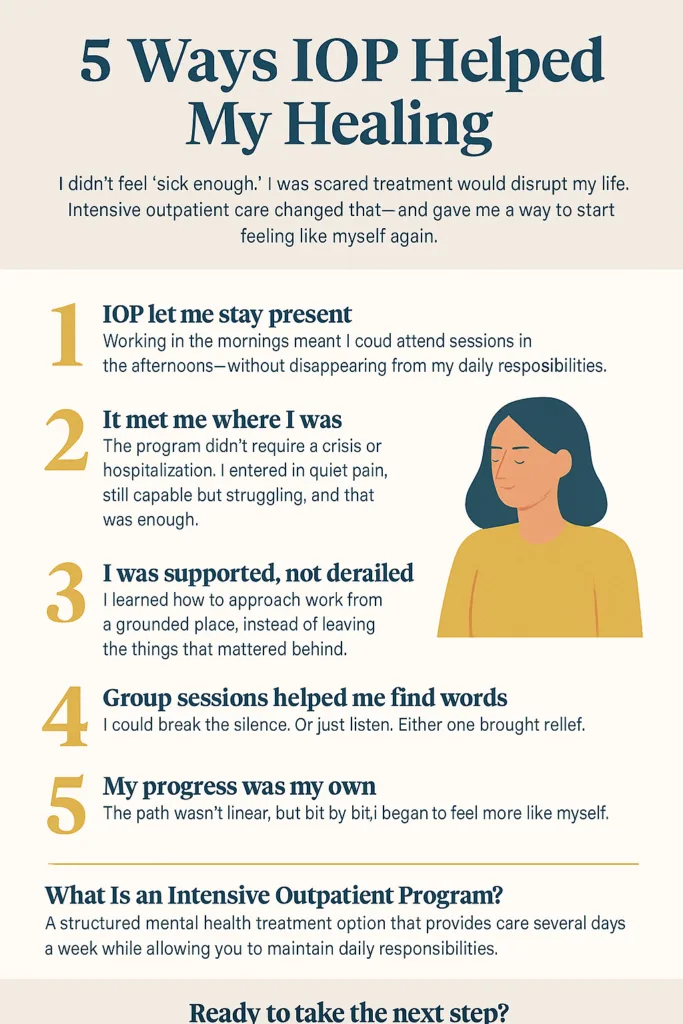I didn’t walk into Greater Boston Behavioral Health feeling hopeful. I walked in because I ran out of other options.
From the outside, I looked like I was functioning. I showed up to work, paid my rent, even smiled at the right times. But inside, I felt like I was unraveling—quietly, invisibly. I didn’t want to fall apart. I just didn’t know how to hold it together anymore.
That’s when someone told me about an Intensive Outpatient Program (IOP). It sounded like a contradiction: intensive help without leaving your life? But I was out of reasons not to try. And that decision changed everything.
1. I Didn’t Want to Start Over—IOP Let Me Stay Present
I was scared treatment meant blowing up my life. The last thing I wanted was to disappear for weeks or explain to my job why I was vanishing.
IOP gave me another way. I could attend sessions in the mornings and still work in the afternoons. I didn’t have to uproot my entire world to get support. Instead of breaking things down, I was building something new, right inside the life I already had.
That meant everything.
2. I Wasn’t Sure I Was “Sick Enough” for Help—Turns Out, I Was Just Human
When you grow up hearing phrases like “tough it out,” you start to think that needing help means weakness. That you have to be in crisis to qualify.
I wasn’t in crisis, exactly. But I was drained, anxious, and afraid of where things were heading. IOP didn’t make me feel like I had to prove I deserved care. They met me where I was—and showed me I was worth showing up for.
I wasn’t too much. I wasn’t not enough. I was just a person in pain.
3. I Got to Keep My Job—and Start Showing Up for Myself Too
The flexibility of the program was more than convenience. It was dignity.
Every day I walked into IOP, I wasn’t giving up my responsibilities. I was learning how to meet them from a more grounded place. My job didn’t suffer—and neither did I.
Instead of using all my energy to appear okay, I was learning how to actually be okay.
4. Group Sessions Helped Me Break the Silence
The part I dreaded most turned out to be the part that helped me the most.
Sitting in group therapy sounded awkward. I imagined silence, judgment, maybe even shame. What I found were people who looked a lot like me—quietly holding their pain in until someone finally said it out loud.
And once that happened, the silence started to break. Slowly, I began to speak up too. I didn’t have to have the perfect words. I just had to be there.
“Hearing someone else describe what I couldn’t put into words gave me more relief than anything I’d tried before.”
—Outpatient Client, 2023
5. Healing Wasn’t Perfect—But It Was Mine
There were hard days. Days I didn’t want to go. Days I questioned everything.
But no one in the program acted like healing had to be linear. There was room for my doubt, my fear, even my silence. And over time, something started to shift.
I laughed again. I slept a full night. I spoke without rehearsing every word.
IOP didn’t turn me into someone else. It gave me space to remember who I actually was.
What Is an Intensive Outpatient Program?
An Intensive Outpatient Program (IOP) is a structured mental health treatment option that provides therapy and support several days a week while allowing participants to maintain their daily responsibilities. Unlike inpatient programs, IOP doesn’t require overnight stays, making it ideal for those balancing work, school, or family.
Frequently Asked Questions
Is IOP only for people with severe mental illness?
No. IOP is designed for a wide range of needs—including people managing anxiety, depression, PTSD, or life transitions. You don’t have to be in crisis to benefit.
How many hours per week is an IOP?
Programs vary, but most include 9–12 hours of therapy weekly, usually split over 3–5 days.
Can I choose virtual or in-person sessions?
At Greater Boston Behavioral Health, we offer both in-person and telehealth options depending on your schedule and preference.
Will my employer know I’m attending IOP?
No one is notified without your consent. Many people use flexible scheduling or FMLA if needed.
How do I know if IOP is right for me?
If you’re feeling overwhelmed but not in need of 24/7 care, IOP could be a strong fit. You can call us to talk it through.
Ready to Take the Next Step?
You don’t have to keep pretending everything’s fine. There is a way to get help without walking away from your life.
Greater Boston Behavioral Health offers a flexible, compassionate intensive outpatient program in Boston that meets you where you are—and helps you move forward.
Call us today at (888) 301-8072 or visit our IOP page to learn more.


